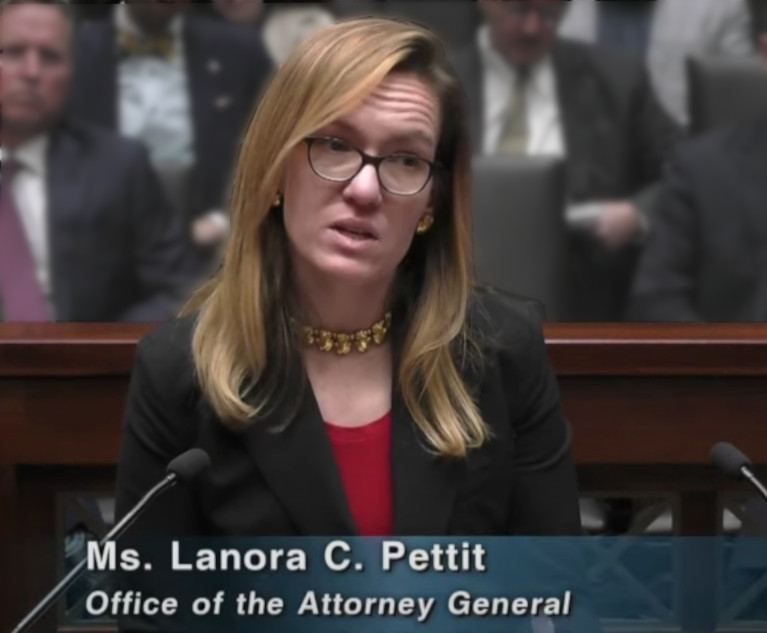Texas Attorney General Joins Law Firm's Constitutional Challenge to Dallas Sick Leave Ordinance
The State of Texas on Tuesday joined a Dallas-area law firm’s and company’s lawsuit against the City of Dallas, attacking the constitutionality…
August 07, 2019 at 03:10 PM
4 minute read
 Photo: Impact Photography/Shutterstock.com
Photo: Impact Photography/Shutterstock.com
The State of Texas on Tuesday joined a Dallas-area law firm’s and company’s lawsuit against the City of Dallas, attacking the constitutionality of the city’s new sick leave ordinance, which requires private employers to give paid sick time to their workers.
Now the state and Hagan Law Group, a management-side employment firm headquartered in the Collin County town of Allen, and a Plano-based staffing agency called ESI/Employee Solutions allege in ESI/Employee Solutions v. City of Dallas that the new sick leave ordinance violates the U.S. and state Constitutions and clashes with a state minimum wage law.
Austin’s Third Court of Appeals in November 2018 struck down a similar sick leave ordinance by the City of Austin, and ordered a trial court to grant a temporary injunction to stop its enforcement. The city is appealing to the Texas Supreme Court. San Antonio is also facing a lawsuit over a similar sick leave ordinance, and last month it agreed to delay the law’s effective date until Dec. 1.
Texas Attorney General Ken Paxton said in a statement that in light of the legal challenges in other cities, the Dallas City Council’s passing of its sick leave ordinance demonstrates “lawlessness and disregard for working Texans that is becoming all too common among local governments in our larger cities.”
“Not only would this ordinance harm the ability of Texans to find and keep jobs, it is a blatant attempt to silence the millions of other voters throughout our state who disagree with the agenda of urban elites, even after the courts have made it clear they cannot do so,” Paxton said.
Seeking injunctive relief, the plaintiffs are suing the city, its city manager and its human rights office director. Although based in Allen, Hagan law claimed that the city’s paid sick leave ordinance will impact the firm because one of its employees works in Dallas, the Aug. 6 amended complaint said.
Hagan Law argued that the sick leave ordinance would require it to get new time tracking software, train staff on the new software and issue monthly statements, for a total cost of $6,400 the first year and $4,000 per year afterward. The cost of sick leave for its Dallas lawyer could be $14,000 per year plus payroll taxes, said the complaint.
The firm claimed it might have to “delay planned wage increases or bonuses for other staff. It could have to raise rates for clients,” the complaint said. “It is also possible that plaintiff Hagan would be forced to cancel its $5,500 per year Westlaw subscription, [and] cancel plans to replace antiquated computer equipment.”
The plaintiffs argue the ordinance clashes with the Texas Minimum Wage Act, which allows the state to set minimum wages and prohibits cities from telling private businesses’ what minimum wages they must pay to workers.
“The paid sick leave ordinance requires employers to pay minimum wage to employees for hours those employees have not actually worked, thereby pushing those employees’ hourly wage above the minimum wage ceiling set by Texas law,” they alleged.
The plaintiffs also argue the ordinance is unconstitutional under the Texas Constitution, which states that cities can’t enact ordinances that are inconsistent with state law. They claim additional violations of the U.S. Constitution’s First, Fourth and Fourteenth Amendments. They’re seeking injunctive relief to stop the city from enforcing the sick leave ordinance and costs, expenses and attorney fees.
Robert Henneke, director of the Texas Public Policy Foundation’s Center for the American Future, who represents Hagan Law and ESI, said in a statement that the ordinance discriminates against his clients for being at-will employers and threatens them with unconstitutional searches.
“The numerous constitutional problems with Dallas’ ordinance demand a remedy,” Henneke said. “We aim to help provide it.”
Dallas spokeswoman Roxana Rubio declined to comment.
Read the amended complaint:
This content has been archived. It is available through our partners, LexisNexis® and Bloomberg Law.
To view this content, please continue to their sites.
Not a Lexis Subscriber?
Subscribe Now
Not a Bloomberg Law Subscriber?
Subscribe Now
NOT FOR REPRINT
© 2025 ALM Global, LLC, All Rights Reserved. Request academic re-use from www.copyright.com. All other uses, submit a request to [email protected]. For more information visit Asset & Logo Licensing.
You Might Like
View All


Trending Stories
- 1Gertrude Stein Is Right On Again
- 2Georgia's Next Judge? Sole Candidate Shortlisted to Rise to Bench
- 3The End of Innocence? DEP’s End Run Around ‘All Appropriate Inquiry’ Spill Act Protections
- 4Pistachio Giant Wonderful Files Trademark Suit Against Canadian Maker of Wonderspread
- 5New York State Authorizes Stand-Alone Business Interruption Insurance Policies
Who Got The Work
J. Brugh Lower of Gibbons has entered an appearance for industrial equipment supplier Devco Corporation in a pending trademark infringement lawsuit. The suit, accusing the defendant of selling knock-off Graco products, was filed Dec. 18 in New Jersey District Court by Rivkin Radler on behalf of Graco Inc. and Graco Minnesota. The case, assigned to U.S. District Judge Zahid N. Quraishi, is 3:24-cv-11294, Graco Inc. et al v. Devco Corporation.
Who Got The Work
Rebecca Maller-Stein and Kent A. Yalowitz of Arnold & Porter Kaye Scholer have entered their appearances for Hanaco Venture Capital and its executives, Lior Prosor and David Frankel, in a pending securities lawsuit. The action, filed on Dec. 24 in New York Southern District Court by Zell, Aron & Co. on behalf of Goldeneye Advisors, accuses the defendants of negligently and fraudulently managing the plaintiff's $1 million investment. The case, assigned to U.S. District Judge Vernon S. Broderick, is 1:24-cv-09918, Goldeneye Advisors, LLC v. Hanaco Venture Capital, Ltd. et al.
Who Got The Work
Attorneys from A&O Shearman has stepped in as defense counsel for Toronto-Dominion Bank and other defendants in a pending securities class action. The suit, filed Dec. 11 in New York Southern District Court by Bleichmar Fonti & Auld, accuses the defendants of concealing the bank's 'pervasive' deficiencies in regards to its compliance with the Bank Secrecy Act and the quality of its anti-money laundering controls. The case, assigned to U.S. District Judge Arun Subramanian, is 1:24-cv-09445, Gonzalez v. The Toronto-Dominion Bank et al.
Who Got The Work
Crown Castle International, a Pennsylvania company providing shared communications infrastructure, has turned to Luke D. Wolf of Gordon Rees Scully Mansukhani to fend off a pending breach-of-contract lawsuit. The court action, filed Nov. 25 in Michigan Eastern District Court by Hooper Hathaway PC on behalf of The Town Residences LLC, accuses Crown Castle of failing to transfer approximately $30,000 in utility payments from T-Mobile in breach of a roof-top lease and assignment agreement. The case, assigned to U.S. District Judge Susan K. Declercq, is 2:24-cv-13131, The Town Residences LLC v. T-Mobile US, Inc. et al.
Who Got The Work
Wilfred P. Coronato and Daniel M. Schwartz of McCarter & English have stepped in as defense counsel to Electrolux Home Products Inc. in a pending product liability lawsuit. The court action, filed Nov. 26 in New York Eastern District Court by Poulos Lopiccolo PC and Nagel Rice LLP on behalf of David Stern, alleges that the defendant's refrigerators’ drawers and shelving repeatedly break and fall apart within months after purchase. The case, assigned to U.S. District Judge Joan M. Azrack, is 2:24-cv-08204, Stern v. Electrolux Home Products, Inc.
Featured Firms
Law Offices of Gary Martin Hays & Associates, P.C.
(470) 294-1674
Law Offices of Mark E. Salomone
(857) 444-6468
Smith & Hassler
(713) 739-1250







